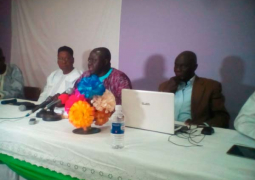Just recently the Gambia Committee on Traditional Practices GAMCOTRAP staged a 2nd public declaration of the dropping of the knife in Basse, Upper River Region.
After the event, She She She had an interview with the Executive Director of the Women's Right NGO, Dr. Isatou Touray.
This is how it went:
She She She: We have just witnessed the second declaration on dropping of knives, can you tell the readers what were the strategies that Gamcotrap have used to convince the circumcisers.
Dr. Touray: First on the strategies, we have embraced every gender sensitive responsive, working with people in the community and understanding why FGM is practice and why women are given low status in the society and also we looked at factors that are influencing such perceptions.
We prepared our program of activities reaching out to various target groups in the communities, used the local languages discussing sexuality, women rights and violence against women.
Through these culturally relevant strategies women were able to make inform choices about FGM and they decided to stop, one of the most critical question was, what is the religious perspective of FGM. We had very progressive scholars who engaged the communities to clarified issues on FGM and Islam and when communities became aware of the realities they agreed to stop.
On the trends, we had two declarations first in 2007 and now 2009.
I would like to assure you that there will be another one in 2010 and 2011 respectively, and this is going to continue if we have resources to reach out to more communities. What people need is to get the right information, to make informed choices.
She She She: How certain is Gamcotrap, that these women will stick on the oath?
Dr. Touray: We are sure, because we had gone through a whole process of capacity building as well as making clarifications, building conscious issues and this has empowered them to choose to stop.
We have also worked with them to come up with an alternative of their choices to address poverty among circumcisers. We believe that they have gone through and the evidence of the effects of FGM is what made them to stop, and we also know that they are committed.
She She She: What are your next steps?
Dr. Touray: Our next step is to cover the remaining regions of the
She She She: will there be a consequence for any of them found doing FGM again?
Dr. Touray: We are trying to monitor them, they are also joining forces with us to continue the advocacy work in maintaining leadership in their communities. We quarterly visit and monitor them. They also serve as community-based facilitators and resource persons. In other words is a network.
She She She: How long does it take Gamcotrap to achieve this unprecedented achievement?
Dr. Touray: Gamcotrap has been in the fight over FGM for 20 years, and because it has to do with religious, we needed to do a lot of community sensitization and awareness programs to break the taboo of silence over FGM. This was followed by a systematic program planning process with targets which leads these results. We used different strategies like I mentioned earlier, we looked at culture, health, religion, women’s rights and AEO (Alternative, Employment Opportunities) for circumcisers.
She She She: What were your constraints in reaching to this stand?
Dr. Touray: There was gross ignorance about religion, to deal with this misconception was formidable, however, we were able to succeed because the Quran was one of our tools for solving arguments.
We also had some good scholars who were honest with their knowledge to support the work we do. I would like to specifically mention Imam Baba Leigh, Ustass Saikou Fayinkey of Basse, Momodou Sanno and other few scholars who have contributed to FGM and Islam in very positive ways.
She She She: What message do you have for the public?
Dr. Touray: The message is that FGM is not religious injunction, and there is no where in the Quran where it is prescribed for women and no where to be found in any authenticated hadith.
She She She: Thanks for your time.
Dr.Touray: You must welcome.


